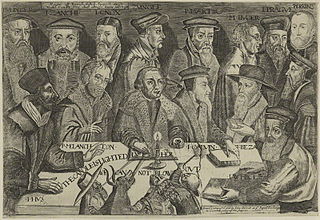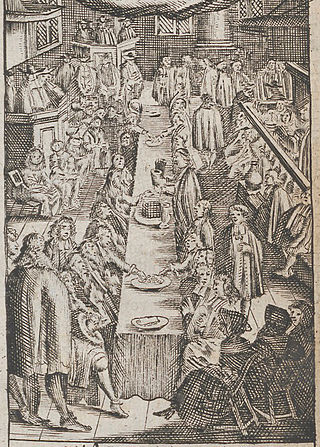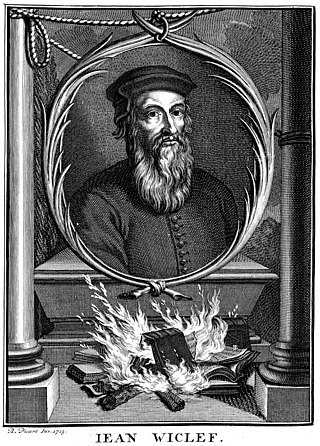
Reformed Christianity, also called Calvinism, is a major branch of Protestantism that began during the sixteenth-century Protestant Reformation, a schism in the Roman Catholic Church. Today, it is largely represented by the Continental Reformed, Presbyterian, Reformed Anglican, Congregationalist, and Reformed Baptist denominational families.

The Eucharist, also known as Holy Communion, Blessed Sacrament and the Lord's Supper, is a Christian rite that is considered a sacrament in most churches, and as an ordinance in others. Christians believe that the rite was instituted by Jesus at the Last Supper, the night before his crucifixion, giving his disciples bread and wine. Passages in the New Testament state that he commanded them to "do this in memory of me" while referring to the bread as "my body" and the cup of wine as "the blood of my covenant, which is poured out for many". According to the Synoptic Gospels this was at a Passover meal.

Transubstantiation is, according to the teaching of the Catholic Church, "the change of the whole substance of bread into the substance of the Body of Christ and of the whole substance of wine into the substance of the Blood of Christ". This change is brought about in the eucharistic prayer through the efficacy of the word of Christ and by the action of the Holy Spirit. However, "the outward characteristics of bread and wine, that is the 'eucharistic species', remain unaltered". In this teaching, the notions of "substance" and "transubstantiation" are not linked with any particular theory of metaphysics.

Peter Martyr Vermigli was an Italian-born Reformed theologian. His early work as a reformer in Catholic Italy and his decision to flee for Protestant northern Europe influenced many other Italians to convert and flee as well. In England, he influenced the Edwardian Reformation, including the Eucharistic service of the 1552 Book of Common Prayer. He was considered an authority on the Eucharist among the Reformed churches, and engaged in controversies on the subject by writing treatises. Vermigli's Loci Communes, a compilation of excerpts from his biblical commentaries organised by the topics of systematic theology, became a standard Reformed theological textbook.
Crypto-Calvinism is a pejorative term describing a segment of those members of the Lutheran Church in Germany who were accused of secretly subscribing to Calvinist doctrine of the Eucharist in the decades immediately after the death of Martin Luther in 1546. It denotes what was seen as a hidden Calvinist belief, i.e., the doctrines of John Calvin, by members of the Lutheran Church. The term crypto-Calvinist in Lutheranism was preceded by terms Zwinglian and Sacramentarian. Also, Jansenism has been accused of crypto-Calvinism by Roman Catholics.

The real presence of Christ in the Eucharist is the Christian doctrine that Jesus Christ is present in the Eucharist, not merely symbolically or metaphorically, but in a true, real and substantial way.

William Farel, Guilhem Farel or Guillaume Farel, was a French evangelist, Protestant reformer and a founder of the Calvinist Church in the Principality of Neuchâtel, in the Republic of Geneva, and in Switzerland in the Canton of Bern and the Canton of Vaud. He is most often remembered for having persuaded John Calvin to remain in Geneva in 1536, and for persuading him to return there in 1541, after their expulsion in 1538. They influenced the government of Geneva to the point that it became the "Protestant Rome", where Protestants took refuge and dissidents such as Catholics and unitarians were driven out, some were even killed for their beliefs. Together with Calvin, Farel worked to train missionary preachers who spread the Protestant cause to other countries, and especially to France.

The Marburg Colloquy was a meeting at Marburg Castle, Marburg, Hesse, Germany, which attempted to solve a disputation between Martin Luther and Ulrich Zwingli over the Real Presence of Christ in the Eucharist. It took place between 1 October and 4 October 1529. The leading Protestant reformers of the time attended at the behest of Philip I of Hessen. Philip's primary motivation for this conference was political; he wished to unite the Protestant states in political alliance, and to this end, religious harmony was an important consideration.
Protestant Reformers were theologians whose careers, works and actions brought about the Protestant Reformation of the 16th century.

Memorialism is the belief held by some Christian denominations that the elements of bread and wine in the Eucharist are purely symbolic representations of the body and blood of Jesus Christ, the feast being established only or primarily as a commemorative ceremony. The term comes from the Gospel of Luke 22:19: "Do this in remembrance of me", and the attendant interpretation that the Lord's Supper's chief purpose is to help the participant remember Jesus and his sacrifice on the Cross.

The Scots Confession is a Confession of Faith written in 1560 by six leaders of the Protestant Reformation in Scotland. The text of the Confession was the first subordinate standard for the Protestant church in Scotland. Along with the Book of Discipline and the Book of Common Order, this is considered to be a formational document for the Church of Scotland during the time.

Eucharistic theology is a branch of Christian theology which treats doctrines concerning the Holy Eucharist, also commonly known as the Lord's Supper and Holy Communion. It exists exclusively in Christianity, as others generally do not contain a Eucharistic ceremony.

Blood of Christ, also known as the Most Precious Blood, in Christian theology refers to the physical blood actually shed by Jesus Christ primarily on the Cross, and the salvation which Christianity teaches was accomplished thereby, or the sacramental blood (wine) present in the Eucharist or Lord's Supper, which some Christian denominations believe to be the same blood of Christ shed on the Cross.

Reformed Christianity originated with the Reformation in Switzerland when Huldrych Zwingli began preaching what would become the first form of the Reformed doctrine in Zürich in 1519.
Frank Colvin Senn is an American liturgist and pastor of the Evangelical Lutheran Church in America. He served as pastor of five congregations: Gloria Dei in South Bend, Indiana, Fenner Memorial in Louisville, Kentucky (1975–77), Christ the Mediator in Chicago, Illinois (1981–86), Holy Spirit in Lincolnshire, Illinois (1986–90), and Immanuel in Evanston, Illinois.
The extra Calvinisticum is the doctrine that the eternal Son's presence is not limited to his assumed human nature but he maintains his existence also beyond it perpetually, from the moment of His incarnation. The term extra Calvinisticum was initially used by Lutherans to refer to the use of this concept in Reformed theology. However, the concept is found in the writings of a wide range of pre-Reformation theologians including the Church Fathers.

The Confession of Faith, popularly known as the Belgic Confession, is a doctrinal standard document to which many Reformed churches subscribe. The Confession forms part of the Three Forms of Unity of the Reformed Church, which are also the official subordinate standards of the Dutch Reformed Church. The confession's chief author was Guido de Brès, a preacher of the Reformed churches of the Netherlands, who died a martyr to the faith in 1567, during the Dutch Reformation. De Brès first wrote the Belgic Confession in 1559.

In Reformed theology, the Lord's Supper or Eucharist is a sacrament that spiritually nourishes Christians and strengthens their union with Christ. The outward or physical action of the sacrament is eating bread and drinking wine. Reformed confessions, which are official statements of the beliefs of Reformed churches, teach that Christ's body and blood are really present in the sacrament and that believers receive, in the words of the Belgic Confession, "the proper and natural body and the proper blood of Christ." The primary difference between the Reformed doctrine and that of Catholic and Lutheran Christians is that for the Reformed, this presence is believed to be communicated in a spiritual manner by faith rather than by oral consumption. The Reformed doctrine of real presence is called "pneumatic presence".

Proto-Protestantism, also called pre-Protestantism, refers to individuals and movements that propagated various ideas later associated with Protestantism before 1517, which historians usually regard as the starting year for the Reformation era. The relationship between medieval sects and Protestantism is an issue that has been debated by historians.
Church music during the Reformation developed during the Protestant Reformation in two schools of thought, the regulative and normative principles of worship, based on reformers John Calvin and Martin Luther. They derived their concepts in response to the Catholic church music, which they found distracting and too ornate. Both principles also pursued use of the native tongue, either alongside or in place of liturgical Latin.












